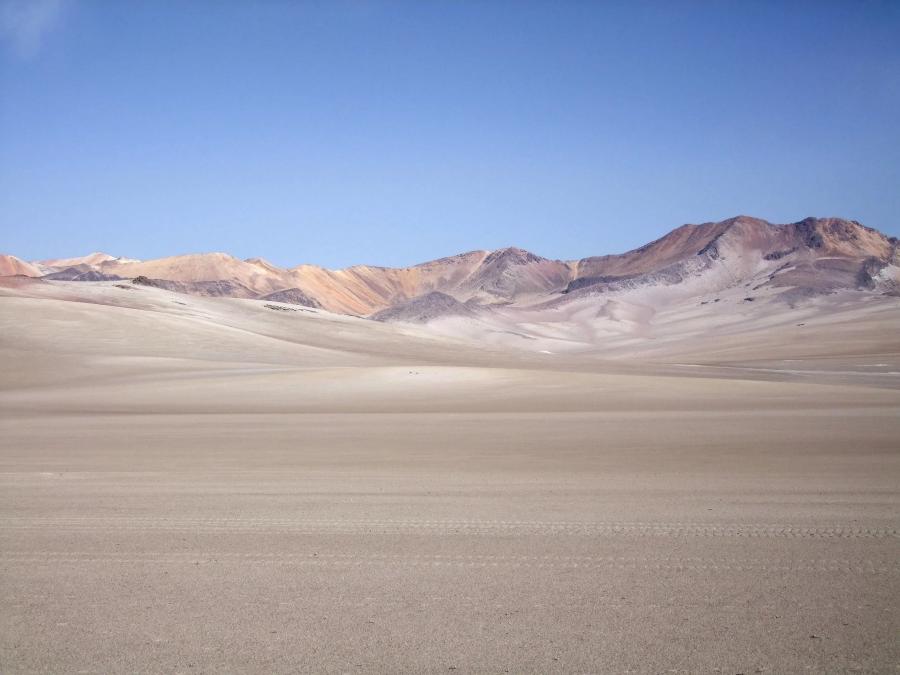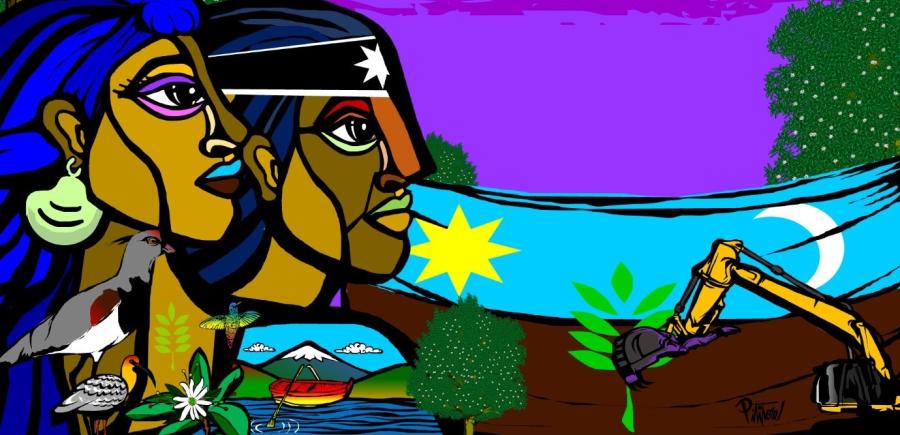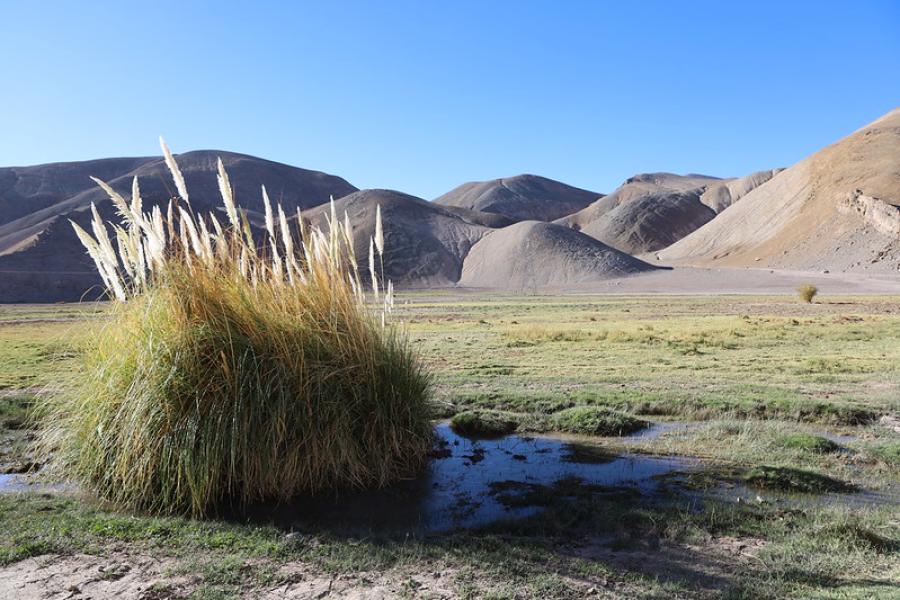Chile’s treatment of indigenous peoples and forests is a warning that all is not well with the free market.
When pressed for evidence that free market globalization can work to create a better world, most advocates point to Chile as the Latin American model of neoliberalism and its economic prescriptions—privatization, free markets, export-led growth and deregulation.
Since the days of the military dictator Augusto Pinochet, Chile has been implementing these policies, applying the strategies of the International Monetary Fund (IMF), World Bank, and more recently the World Trade Organization (WTO). Though most of Latin America and developing countries around the world have been forced to accept what economist Thomas Friedman terms a “golden straightjacket,” there are few that have been as committed to this course as Chile.
A closer examination of the Chilean experience, however, reveals that Chile is the scene of profound social and environmental problems that should come as a warning to countries in the South analyzing the range of strategies for economic development. If Chile is to serve as an example, its wholesale elimination of native forests and unjust persecution of indigenous leaders and activists indicate a critical need to revisit the free trade model.
Exporting Chile’s Ecosystems
A leading industry in Chile’s export-led growth strategy is the forestry sector, which accounts for about 15 percent of Chilean exports. Over the past few decades, the government has sought to export its way to prosperity by subsidizing the conversion of native forests to plantations. Together with poorly enforced environmental standards, the government subsidization of plantations has resulted in staggering levels of forest loss. The acreage in arrow-straight plantation rows has exploded five-fold since 1974 and now covers more than 5 million acres. The forest products export market is valued at over $2.5 billion annually.
What has been lost is much of Chile’s globally significant temperate rainforests, a unique ecosystem pressed between the Andes Mountains and the Pacific Ocean. Many of the species found there exist nowhere else in the world—the world’s smallest deer called the pudu, ancient alerce trees that challenge the bristlecone pines for the status of the oldest trees on the planet, and the otherworldly araucarias known also as monkey-puzzle trees.
Up to half a million acres of Chilean forest have been destroyed annually since the 1970s, according to the University of Washington’s Center for International Trade in Forest Products. The forests have been replaced by quick-growth Monterey pine and eucalyptus, largely planted by the firms Arauco and Empresas CMPC, to make wood products such as pulp, lumber, and house moldings destined for Japan, Europe, and the United States. Though the plantations may bear some resemblance to forests, they have little value in terms of biodiversity, involve heavy applications of toxic pesticides, and have dried up precious underground water sources as they are harvested every 20 to 25 years. The plantations have also caused habitat loss and the decline of populations of numerous bird and mammal species. Many mammals are now endangered, including the huemul (a large deer species of which only about 1,000 exist), several species of large cats and foxes, the southern river otter, and the long-snout rat-opossum. Others, like the pudu deer, southern sea otter, and puma are vulnerable to extinction. In 1995, the Central Bank of Chile estimated that outside of national parks, the rate of conversion would virtually eliminate the nation’s original forests by 2015.
Mapuche Resistance and the State’s Response
The disappearance of native forests has both impacted and ignited local indigenous Mapuche communities, who still lay claim to much of the land in question. In addition to the destruction of their resource base and sacred sites, the Mapuche suffer from depleted and contaminated water supplies. An analysis by José Araya Cornejo of the Latin American Environmental Conflict Watch (Observatorio Latinoamericano de Conflictos Ambientales) in April 2003 found health problems among Mapuche communities that are likely linked to the pesticides used in Chilean monoculture forestry. Spurred by this incursion into their territory, Mapuche leaders and communities have struggled to recover their land. Often their efforts are met with swift and violent responses by Chilean authorities.
In 2002, 17-year-old Mapuche Alex Lemun was shot and killed while protesting the seizure of indigenous lands to be used for a CMPC tree farm bordering his community. His killer, Major Marco Aurelio Treuer, was acquitted despite an internal investigation in which a military prosecutor found that when “Major Treuer fired the shot there was no real and imminent danger” and that “the force used at the time of events was completely unnecessary and had no rational motive that could justify it,” according to an October 2004 report by Human Rights Watch and the Chile-based Indigenous Peoples’ Rights Watch.
During a 2003 raid of a Mapuche community, police attacked Luis Lican, an elderly Mapuche man. According to a Human Rights Watch report and Jose Aylwin’s book Los Derechos de los Pueblos Indigenas en Chile, Adriana Loncomilla, who witnessed the assault, said the carabineros (police) “shot him down and left him there full of pellets. After they shot him, they kicked him, stepped on him, and kept hitting him. The carabineros were saying, ‘Go on run away now, asshole,’ and laughing.” The carabineros said the raid was meant to be a “search.” Lican was not arrested, and reports say he was merely a startled bystander.
Two of Chile’s most high-profile political prisoners are Pascual Pichún and Aniceto Norín, jailed since April 2004 in the southern town of Traiguen. The traditional Mapuche leaders, lonkos as they are called in the Mapudungun language, are serving five years and a day, having been prosecuted under the anti-terrorist laws that date back to the Pinochet dictatorship for “terrorist and arson threats” including charges that they burned forests and manor houses. Despite their acquittal by a trial court on charges of arson, the lonkos were convicted of “terrorist threats” in a subsequent politicized case involving hidden witnesses and lack of due process. On top of those charges, Pichún and Norín, along with 14 other Mapuche activists, were also charged with “illicit terrorist association.” If found guilty, they could receive an additional sentence of 10 years. These charges had been absolved by the Criminal Court of Temuco for lack of evidence, but that decision was overruled on April 8, 2005, by the Chilean Supreme Court. That trial is scheduled for June 2005.
The wrongful labeling of the lonkos as terrorists was employed to achieve “justice” through procedures that are unavailable to prosecutors through the conventional criminal code, says Human Rights Watch. Their imprisonment is a message to others inclined to speak out against the encircling plantations: there is limited room and tolerance for dissent in Chile.
In a July 2004 prison interview, Pichún, 52, explained that he has been targeted “for being the lonko and community president,” and his five years in jail are Chile’s way of exercising “the maximum rigor of the law.” Speaking of the two men’s families, including his two sons who are currently being sought by the authorities, he said, “They feel totally abandoned, insecure and traumatized. Our wives and children are alone.”
Norín, father of five, and five years younger than his cellmate, explained why he risked speaking out against the politically powerful forestry companies: “The plantations have greatly impacted the community. We have lost our medicinal herbs, our native forests and water. The fumigation of the tree plantations has polluted the water, and contaminated the lands and animals.”
Both a United Nations investigation by the U.N. Special Rapporteur on the Situation of Human Rights and Fundamental Freedoms of Indigenous People, Rodolfo Stavenhagen, and the October 2004 Human Rights Watch report titled “Undue Process: Terrorism Trails, Military Courts, and the Mapuche in Southern Chile,” have criticized the Chilean government for criminalizing legitimate social protest.
Indigenous Critique of Neoliberalism
Konapewman is a leading Mapuche group. Its name translates roughly as “the dreams of Mapuche youth.” Konapewman has committed itself to not only fighting for the rights of Mapuche people, but also to understanding the role that international forces and institutions play in affecting their future. The group played a lead role in organizing a series of forums and protests that ran concurrent with last year’s meetings in Chile of the Asia Pacific Economic Cooperation—neoliberal forum for 21 countries of the Pacific Rim.
In 2003, one member of Konapewman, Alfredo Seguel, traveled to Cancun, Mexico, to take part in events organized around the ministerial meeting of the WTO, and to discuss with other indigenous leaders the impacts of free market globalization on their communities. As do many indigenous people, Seguel spurns neoliberalism, holding it partly responsible for the problems facing his people.
“ We do not want this model of development which signifies depredation, exploitation, and destruction of our natural resources,” said Seguel, who fears that things will only get worse with new trade agreements. The proposed Free Trade Area of the Americas, a trade pact for the entire Western Hemisphere except Cuba, would “mean the continued extermination of life in rural indigenous communities,” Seguel said.
As opposed to “lifting all boats,” a term proponents of neoliberalism often use in their argument that free trade agreements will benefit all socioeconomic sectors of society, Chile’s export-led growth appears instead to have widened the gulf between the Chilean majority and the Mapuche population. Indigenous people in Chile suffer from a higher rate of poverty, lower wages, and poorer education and health care, according to Temuco’s Universidad de la Frontera’s Indigenous Studies Institute. It is not as if the impacts of globalization are unknown. In The Lexus and the Olive Tree, Friedman admits “because globalization as a culturally homogenizing and environment-devouring force is coming so fast, there is a real danger that in just a few decades it could wipe out the ecological and cultural diversity that took millions of years of human and biological evolution to produce.”
Market forces must be kept in check by safeguards (standards regulated by local, state, and federal governments) if we want to avert disasters known to economists as “market failures” and to the rest of us as deforestation, pollution, loss of culture, and civil unrest. But the opportunity to strike a balance between development on the one hand and social and environmental objectives on the other is rarely paid more than lip service in deliberations by institutions like the IMF and the WTO.
Environmental and social deterioration aside, many have challenged whether the Chilean “economic miracle” is in fact an outcome of economic globalization. Chile’s relative prosperity must be placed against a backdrop of economic stagnation and decline during the modern era of neoliberalism—the period from 1980 to 2000 in which Latin America’s per capita gross domestic product growth lagged at six percent, precipitously down from 75 percent between 1960 and 1980, according to the Center for Economic and Policy Research.
The IMF’s March 2003 admission that globalization may actually increase the risk of crisis in the developing world underlines this uncertainty. Sounding remarkably like its detractors, the IMF found: “Globalization has heightened these risks since cross-country financial linkages amplify the effects of various shocks and transmit them more quickly across national borders.” The IMF’s solution of “good institutions”—startling in its simplistic insufficiency—makes haste in shrugging off recent collapses of neoliberalism’s disciples—from Argentina to Russia to eastern Asia—whose astounding economic plunges were each precipitated by IMF prescriptions. Should we wonder when it will be Chile’s turn to plummet from exemplar of market fundamentalism to economic pariah?
Much deeper changes than better institutions will be needed, including a departure from the neoliberal blueprint and a fundamental restructuring of a global economic architecture in which the world’s wealthiest countries leverage debt as a weapon to dictate the South’s economic policies. As Chile shows, the price of free trade can be terrifically expensive, while its bold promises of prosperity often go unfulfilled. With the neoliberal highway littered by social and environmental crises, the task is now to find a new path for global integration.
Jason Tockman (tockman@riseup.net) is a globalization activist and consultant for environmental and social justice organizations, most recently for the Buckeye Forest Council, the Ohio Conference on Fair Trade, and the Farm Labor Organizing Committee. He divides his time between South America and Athens, Ohio.



